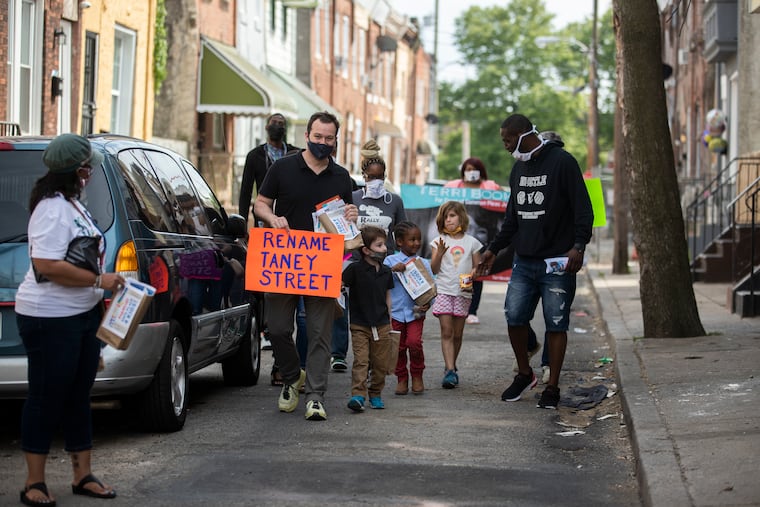Roger Taney’s statue will be ousted from U.S. Capitol. Next: Renaming the Philly street | Opinion
For a city that prides itself on diversity, commemorating the judge who used his high perch to strip the most fundamental rights from African Americans is a wrong that must be righted.

This week, the United States House of Representatives voted to remove a bust of Roger Taney from a prominent place of honor in the U.S. Capitol. In Philadelphia, however, Taney remains in a prominent place of honor. It’s time to take it down. It’s time to rename Taney Street.
Philadelphia’s Taney Street is named for Roger B. Taney, chief justice of the U.S. Supreme Court who wrote the Dred Scott decision. The decision ruled that Black Americans were not and could never be U.S. citizens, with Taney going so far as to write that they “had no rights that the white man was bound to respect.” Many believe the decision, made in 1857, propelled the U.S. into the Civil War.
Minor Street in Fairmount was renamed Taney Street in his honor in 1858, just one year after Dred Scott. Today, Taney Street runs non-consecutively between 26th and 27th Streets from one end of the city to the other. For a city that prides itself on diversity, equity, and inclusion, commemorating the judge who used his high perch to strip the most fundamental rights from African Americans is a wrong that should be swiftly righted.
» READ MORE: On a Philly street, a campaign to change a name that causes pain in the Black community
We write as residents and neighbors of Taney Street who were galvanized by the death of George Floyd and many others at the hands of police violence and horrified by the injustices of a U.S. criminal justice system that treats Black and brown Americans as less than citizens. Suggesting the city should change the name of Taney Street is not a new idea. Longtime residents and neighbors of Taney Street report discussing it in the 1980s. The name can be changed by City Council passing an ordinance through a straightforward legislative process spanning a few weeks, which could be started when they return in September.
Determining support among residents and neighbors has been challenging for all-volunteer civic organizations during a period of public health restrictions, but with multiple events, door hangers, and active digital media, our volunteer group has established widespread support for the change. We have built (and continue to expand) a coalition of partner organizations from the neighborhoods where Taney Street is present. Over 2,700 people have signed our petition on www.renametaney.com, and 89% of Taney Street residents who participated in our outreach want to change the name. We hope residents can rally around a new name in honor of someone who accurately reflects the achievements and aspirations of an inclusive and diverse city.
» READ MORE: Rename Taney Street in Philly is the latest campaign to erase a racist past
Symbols matter. One might ask: Isn’t changing a street name a hassle, and don’t we have bigger problems? Taking down a real and tangible representation of white supremacy that has stood for 163 years doesn’t feel like a small problem to us. Indeed, it’s part of developing a larger public conversation around race and inequality, and it won’t be taken as a substitute for the real reform needed in institutions at every level of government.
Over the past year, we’ve built a coalition across neighborhoods from different socioeconomic backgrounds to find common ground on this issue. And that’s not something that happens every day in this city or any other. These relationships can be a crucial starting point for having the bigger discussions we must undertake to address the deeper roots of structural racism.
The racist decisions of the past shouldn’t define our current communities. Instead, we should aspire to shape how future city residents, like our own children, will make the city more just and welcoming to all.
Tyrique Glasgow, Joshua Isserman, and Ben Keys are representatives of the Rename Taney Coalition, a volunteer group of residents and neighbors of Taney Street.